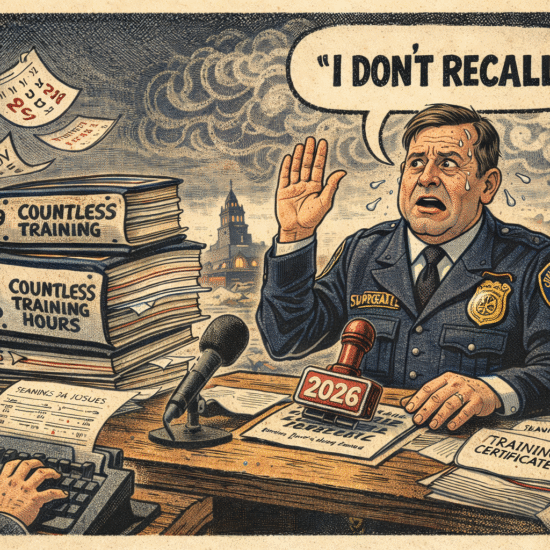Mayor Paine’s Environmental Contradictions: A Leadership Void in Superior
Superior, Wisconsin, rests at the edge of Lake Superior, a natural treasure that demands bold environmental stewardship. Yet, beneath the green rhetoric of Mayor Jim Paine lies a leadership marked by contradictions, fiscal mismanagement, and ethically questionable decisions.
While Paine champions sustainability in public, his administration has allowed the city to remain deeply dependent on fossil fuel revenue—most notably, the Pipeline Terminal Tax, which accounts for more than 12% of Superior’s General Fund. This reliance persists even as expenses rise, revenues decline, and opportunities to diversify the city’s income are actively opposed. Paine’s rejection of the Nemadji Trail Energy Center (NTEC) project epitomizes this failure, leaving Superior without a stable financial plan and pushing the city toward either severe budget cuts or tax hikes on already burdened residents.
Over the three-year period that data is currently filed with the state:
2020: Revenues were $57.4 million against expenditures of $57.8 million, resulting in a slight deficit of $334,326.
2021: Revenues increased marginally to $57.9 million, with expenditures at $57.8 million, leading to a small surplus of $99,581.
2022: Revenues declined to $47 million, while expenditures were $48.5 million, resulting in a deficit of $1.49 million.
Oil Money: Superior’s Crude Dependence
At the heart of Superior’s financial stability lies a paradox: the city’s progressive ideals rest precariously on a foundation built from crude oil. The Pipeline Terminal Tax, fueled by Enbridge’s operations, contributes over $4.3 million annually—accounting for more than 12% of Superior’s General Fund. Without it, the city would face a financial shortfall in 2025 so catastrophic that essential services and infrastructure funding would be jeopardized.
This stark reality exposes a troubling contradiction in Superior’s leadership. While Mayor Paine champions environmental policies, his administration has done nothing to address the city’s reliance on fossil fuel revenue, leaving Superior’s financial future vulnerable to both market and environmental shifts.
Environmental Posturing, Financial Dependency
Mayor Paine has cultivated a reputation as an environmental leader, advancing small-scale sustainability initiatives and opposing fossil fuel-adjacent projects like the Nemadji Trail Energy Center (NTEC). Yet his administration has presided over a deepening reliance on Enbridge’s oil money. The hypocrisy is glaring: without Enbridge’s terminal tax, Superior’s fiscal condition would be in tatters.
Had Paine’s environmental policies been in place during Enbridge’s expansion, the city would have missed out on this critical revenue stream entirely. This contradiction underscores a larger failure to reconcile environmental ideals with the fiscal realities of running Superior. Instead of tackling the problem, Paine has leaned on symbolic green initiatives while ignoring the city’s precarious dependence on crude oil dollars.
A Missed Opportunity for Fiscal Stability
The rejection of NTEC, a proposed natural gas facility that promised a stable new revenue source, exemplifies Paine’s failure to prioritize Superior’s financial stability. While city expenses climb and traditional revenue streams stagnate, Paine has chosen opposition over innovation.
Superior’s dependence on fossil fuel revenue is unsustainable. As the global energy landscape transitions, Enbridge’s operations—and by extension, its tax contributions—face inevitable decline. Yet, Paine’s administration offers no alternative revenue streams or contingency plans, leaving Superior’s fiscal foundation increasingly unstable.
Trading Public Resources for Private Gain
The contradictions in Paine’s governance extend beyond financial mismanagement. His controversial attempt to trade public forest land to remove an easement on his relatives’ property illustrates a troubling willingness to prioritize personal interests over public good.
The easement in question restricted certain property uses, complicating Paine’s family’s plans. Rather than pursue equitable solutions, Paine proposed trading city-owned forest land—an asset meant for community benefit—to resolve a private issue. This move eroded public trust and raised serious questions about his integrity as a leader.
Rising Costs, Dwindling Revenues
The numbers don’t lie: Superior faces rising costs with no clear plan for diversifying its revenue base. The city’s reliance on Enbridge leaves it exposed to the whims of the oil industry, while Paine’s opposition to projects like NTEC ensures a lack of alternatives.
The consequences of this short-sightedness are profound. If regulatory pressures force Enbridge to scale back or global trends reduce demand for oil, Superior will be left scrambling to plug a gaping hole in its budget. Paine’s failure to plan for this scenario is a dereliction of duty.
Moral and Fiscal Failures
Superior’s dependence on oil revenue isn’t just a financial issue—it’s a moral failing. By refusing to diversify the city’s revenue streams, Paine has locked Superior into a precarious cycle of dependency. His environmental posturing rings hollow in light of his administration’s inaction on meaningful financial reform.
If Paine were serious about sustainability, he would embrace hard choices: cutting budgets, pursuing alternative revenue sources, and fostering a transition away from fossil fuel dependency. Instead, his administration has relied on greenwashed rhetoric, sidestepping the urgent need for fiscal and environmental accountability.
Conclusion: A City at the Crossroads
Superior’s reliance on oil money may keep the lights on today, but it’s a ticking time bomb for tomorrow. Mayor Paine’s environmental grandstanding, paired with fiscal inaction, leaves the city exposed to financial calamity.
To secure a sustainable future, Superior’s leadership must reconcile its ideals with fiscal realities. The city needs transparent governance, diversified revenue streams, and a bold plan to wean itself off fossil fuel dependency. Without these, Superior’s future will be as volatile as the oil market it relies on.
Sourced from State Filings



